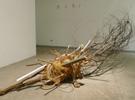戴卓群:它等于是把我们个人面对社会变迁的声音具体化了,《萨迦》做完以后还有具体计划吗?
Dai: It amounted to concretizing the voices of individuals facing social change. After Sakya is complete, do you have any specific plans?
张小涛:我在未来两年可能会拍一部关于美术生考大学的片子,献给我们屡败屡战的青春期,学生被考疯了,没考上,这种疯狂,考试成为我们的个人宗教,疯狂的追求理想,最后带来毁灭。我想拍成一个艺术家电影,我先去构思这个东西,我的方法是先设计蓝图,做好以后按照蓝图去做,方向不能乱,未来两年我想把电影和新媒体融合。人生是轮回的,去年四川美院校庆期间阳光灿烂,我觉得是1992年刚考上大学记忆的重现
Zhang: Over the next two years I may be making a film about art students testing into college, a tribute to our difficult youth. Students go crazy taking these tests, and don’t pass. This fervor has become a kind of individual religion, the crazed pursuit of ideals that leads to destruction. I want to make it a film about artists. I have to work out the concept. My method is to start with a blueprint and follow that to the letter, so I don’t get off course. Over the next two years I want to make a fusion between film and new media. Life is cyclical. Last year, the anniversary celebration for the Sichuan Academy of Fine Art was very lively and festive. It felt like my memories from entering the school in 1992 had come back to life.
戴卓群:第二次上大学的感觉,当年义无反顾地离开,但是没想到轮回一圈,如今又回去。
Dai: It’s like going back to college again. We left without looking back, but never imagined that we would end up going full circle.
张小涛:人生是千回百转的,我现在看当时的疯狂,崩溃,对今天影响力是很大的。青春期在一个工业的场域中展开的记忆,会刻骨铭心的!后来我经历了一个转换,从一个他者的角度去看,它已经变化了,经历了二十年的变迁,我们对全球化与本土化、地缘政治等等问题的思考,随着时间和空间的变化,一切都清晰起来了。
Zhang: Life is a series of endless cycles. When I look back at my fervor and distress back then, it still has a powerful influence today. My youthful memories unfolded in an industrial setting. Oh, the memories! Later I experienced a transference, looking at things from the perspective of others. It has changed. After twenty years of changes, our ideas about globalization, localization, regional politics and the like have all become clear through changes in time and space.
戴卓群:所以这是你个人的经验,我们刚才说,对传统的文明,不管是汉地的文明还是藏地的文明,它都有它的生命力,今天发生变迁,被消解,被抛弃,被干预,但它的生命是轮回的,只是我们处在一个不同的周期而已,
Dai: So this is an individual experience of yours. I was just saying that traditional civilization, whether it is Han Chinese or Tibetan, all has vitality. It is changing now, dissipating, being discarded and interfered with, but its life is cyclical. We just live in a different phase of it.
张小涛:我相信有这种转化,肉身可朽,精神不灭。
Zhang: I believe in this transference. The body is mortal but the spirit is not.
戴卓群:就像传统的回归也是一样,我们所有的这一代人,我们在拼命的往外冲,而我们对外界的想象是无限美化和放大的结果。你现在教育你的孩子的时候,你已经给他最传统的东西,因为你已经开始在回归,你希望给他的是这样的文化而不是那样的文化,你已经做出了价值判断,认为这样的文化是更好的文化。
Dai: It’s just like the return to traditions. Everyone in our generation has been pushing outwards, and in our minds, the outside world was infinitely beautified and magnified. Now, when you’re educating your child, you’re giving him the most traditional stuff, because you have already begun your return. You want to give him this kind of culture rather than that kind of culture. You’ve made a values judgment, and have decided that this kind of culture is better than that kind of culture.
张小涛:血浓于水啊,我觉得它是更适合我们的空气,我们的土壤中生长的,因为,我常想起我的童年,学武术、练书法、野蛮生长、对一个东西的虔诚,投入,疯狂,这些对我今天来说非常重要的东西,它不是工具,而是内在的发动机,是一个人的根本和核心。
Zhang: Blood runs thicker than water. I think it is more suited to our air; after all, it did grow in our soil. I often think of my youth, studying martial arts, practicing calligraphy, running wild, my devotion, effort and fervor towards things, these have become very important in my life today. They are not tools, but an engine within me, the root and core of an individual.
戴卓群:我最近接触了很多事也是这样,我针对吕澎“溪山清远”的展览写了一个文章,标题叫《溪山已远,清风徐来》,因为溪山真的已经远去了,现在的“溪山清远”只是一种古典幻想。同时,溪山虽然已经离我们很远,但清风是可以从遥远的山谷中吹过来的,即便充盈在高楼大厦之间,但是我们肯定会重新找到那种东西,尽管不是原初的那个样子。
Dai: A lot of things I’ve come across recently are like this. I wrote an essay about Lu Peng’s “Xishan is Distant yet Clear,” entitled Xishan is Distant, the Breeze Blows Soothingly. Xishan really is distant now. That ideal about Xishan is just an ancient fantasy. At the same time, while Xishan may be distant, a soothing breeze still blows from the distant mountains. We may be amidst the towering skyscrapers, but we can still find that stuff again, even though it isn’t quite what it used to be.
张小涛:这也是万物有灵,轮回转换的东西,我们家园丁每天种菜、施肥、浇水,他说:任何东西都是不死的,都是轮回的。他说得很透彻。
Zhang: This is about all things having spirits and everything changing in cycles. My family would grow vegetables, watering and feeding them every day. He said, nothing ever dies; it is all a cycle. He cut right to the root of it.
戴卓群:这就叫民间智慧。
Dai: That’s what is called folk wisdom.
张小涛:万事万物轮回不灭,比如在艺术维权过程中,我们俩常常感觉有一种默契,这个默契是什么呢?是有一个共同的传统的价值观。
Zhang: All things are cyclical, never dying. For instance, in the process of the artist’s rights defense action, we always felt this cohesion. What was the source of that cohesion? It is shared traditional values.
戴卓群:是价值取向的共识。
Dai: A values consensus.
张小涛:你可以去争取基本的权利,但你不要去侵犯他人,你可以搞极端,但你不要让别人去当炮灰,我们已经有这种底线,不能因为个人要成为某种道德的卫士而让更多的人跟着你去“革命”,这个不行。你承担你的责任,我承担我的责任,这是某种传统的情怀,不该把群众人作为利用的工具。“暖冬”我们可以看到人性中很多本质的东西,后来发生的事让人很感慨。我把《萨迦》整合起来看,它是谈宗教的世俗化,谈传统的某种缩影,谈我们今天怎么观看传统?以及对我们的影响,虽然我是用动画做的,上次我在中奥新媒体论坛的一个演讲上,我虽然谈的新媒体,但核心是跨越考古学、藏学、和新媒体的边界,关心新技术、心灵、传统的关系,是一种交叉和超越。我想这就是我们做新媒体的意义,不然你就会成为一种符号,一种媒介的奴隶,没有更深层的脉络和生命力,我希望历史、现实、社会学和语言本体的东西是融合在一起的,不是二元对立,而是一个多重世界的关系。
Zhang: You can struggle for basic rights, but you mustn’t violate the rights of others. You can be extreme, but you can’t treat others like cannon fodder. We all had this basic bottom line. It is not acceptable to pull others into some “revolution” so that you can become some defender of morality. You take your responsibility, I take my responsibility. It is a kind of traditional sentiment. The masses cannot be used as tools. During “Warm Winter,” we saw a lot of the essence of human nature, and people were moved by the things that happen. Sakya is essentially about the secularization of religion. It presents a microcosm of tradition, discussing how we view tradition today, and how it influences us. When I spoke at the China-Australia New Media Conference, I said that though I’m talking about new media, the project crosses the boundaries of archaeology, Tibetology and new media, and focuses on the relationships between new technology, the soul and tradition. It is both intersection and transcendence. That is the significance of doing new media. Otherwise it just becomes a symbol, and you’re just a slave to a medium, lacking deeper roots and vitality. I hope for a fusion between history, reality, sociology and language. It is not a standoff but a multiple world.




